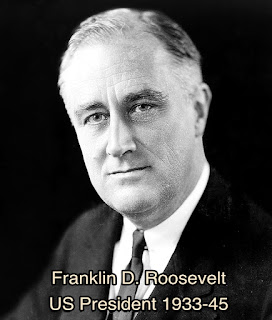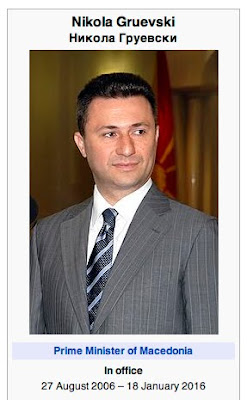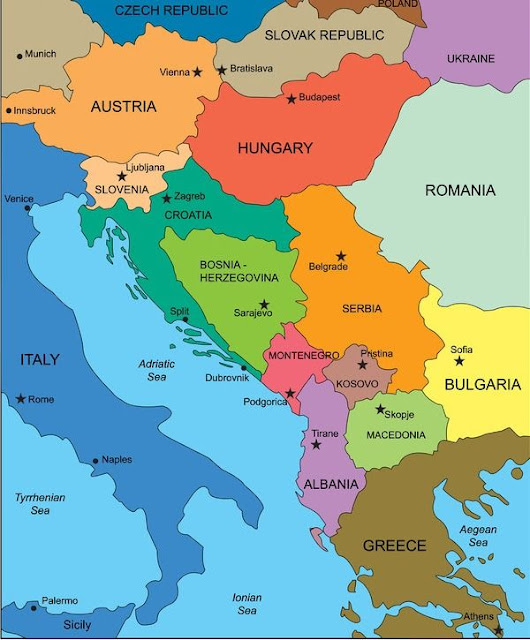
An interview with Mr Nestor Oginar, an American Macedonian community leader and dissident member of the Macedonian VMRO-DPMNE political party – after his very recent return from Macedonia.
He offers his views over Macedonia’s political crisis, which was triggered last year by the Opposition party SDSM leader Zoran Zaev who confronted Macedonia’s Prime Minister Nikola Gruevski of the VMRO-DPMNE party with secretly taped recordings showing corrupt government dealings. Gruevski resigned in early 2016 to make way for a caretaker government and for elections sometime this year as directed by European Union intervention known as the Przino Agreement. see link
It is constitutional, political, economic, ethnic, moral but, in my view, it is rooted in the mentality of the political and intellectual establishment and projected onto the general culture of the people wherein it finds a fertile ground for growth. When you have political and intellectual leadership which has been blatantly ambiguous about its national identity, about its desire for real national independence, then you have politicians in the highest institutions of the government who openly claim and clamor for Yugoslavia, Serbia or Albania. When you are confronted with a glaring absence of a strong national center which asserts its cultural and national identity and projects it on the people, then you’ve planted the seeds for the development of a latent crisis which will erupt sooner or later. This is what is happening today in Macedonia.
– THE BLAME GAME? –
Macedonia of today desperately needs leaders, intellectual and political, who will acknowledge the scope of the crisis and accept the responsibility thereof, instead of pointing accusatory fingers at each other.
So, the way out of the quagmire must be done in a few carefully planned steps or phases, both in a short and long run, by a new National Doctrine which must throw light upon the indisputable historical facts of the Bucharest Treaty (1913), the division of Macedonia and the plight of the Macedonian people who have been either exiled from their ancestral homes, or have found themselves denied their basic human rights to live as Macedonians within the borders of their dismembered homeland !
Furthermore:
d). Constitutional reforms which will curtail the too powerful role of the government;
m). Putting an end to any negotiations with anybody regarding the Macedonian national name and identity.
This seems to be a Herculean task to accomplish by any government but it is feasible and it must be undertaken by any party in government for the sake of the survival and prosperity of Macedonia and the Macedonian people!
Question 3: Your views on Prime Minister Nikola Gruevski (2006-16) and Opposition leader Zoran Zaev?
Question 4. Macedonia’s Prime Minister Nikola Gruevski’s foreign policy has been very inconsistent, to say the least! There was the positive strategic alliance with Hungary then the odd joint embassy sharing agreement with Serbia, silence on Macedonian minorities in Greece and Bulgaria and under-utilising Croatia as an “honest broker in the Balkans” to influence Kosovar Albanian nationalists to lower the temperature in Macedonia. Why is this inconsistency?
Oginar: Gruevski’s domestic and foreign policies have been inconsistent, improvisational and devoid of any sustainable national strategy, logic or rationale. This is not surprising at all considering the policies of Macedonia’s previous governments lead alternately by SDSM and VMRO- DPMNE.
For decades Macedonia has been subject to centrifugal forces which have pulled the country either towards Belgrade or Sofia. This inherent strife has generated a chasm within the national fabric the consequence of which has been the penetration of the Albanian nationalist factor which is more than evident today.
– HISTORICAL FACTORS IN THE FOREGROUND AND BACKGROUND – Strong Identity, Soft identity?
I have argued that the main reason for this situation is to be found in the historical fact that Macedonia and her people, historically speaking, have never been able to live and evolve as a fully defined nation through a necessary period of a “Romantic Nationalism”- a process which has already been finished in Serbia, Bulgaria, Greece and Albania.
We can look for its causes in the Treaty of San Stefano, The Berlin Congress, the failed Ilinden uprising (1903), the Bucharest Treaty (1913) and so on as processes which have always thwarted the nascent national awakening in the consciousness of the Macedonian people.
The political and cultural influence asserted throughout these historical periods by Macedonia’s neighbors, especially by Serbia and Bulgaria, has created a national void which is yet to be filled by a fully awaken Macedonian identity.
One can find the symptoms of these splits today both in VMRO-DPMNE and SDSM manifested in a variety of ways in the cultural and political interpretation of Macedonian daily life. Until and unless the “patriotic forces” in both of these parties prevail over the centrifugal “Vrhovisticki” [Supremacist i.e. pro Bulgarian] or Belgradist forces, we will continue oscillating between Sofia and Belgrade, between Athens and Tirana in their struggle to assert their hegemony in the very heart of the Macedonian national identity.
I expect this strife to culminate in the struggle for the preservation of our national name.
Until and unless Macedonia is soon ruled by a true patriotic national government she will continue to be the victim of the crimes of petty politicians and criminals such as [politicians both past and present] Branko Crvenkovski, Ljubco Georgievski, Ali Ahmeti, Menduh Thaci, Nikola Gruevski and Zoran Zaev whose lack of national character, will and vision has torn Macedonia apart for too long.
Oginar: The persecution of the Macedonian intelligentsia in the diaspora has a long history. The post Second World War period, since 1944-45 and on, including the Civil War in Aegean Macedonia (1946-49) under Greek occupation, marks a systematic liquidation, literal and metaphorical, of many Macedonian patriots who were forced to flee their homeland and seek refuge abroad, especially in the West.
The communist regime’s propaganda machinery at that time in Macedonia [Yugoslavia] created a poisonous climate of suspicion and hatred against the Macedonians abroad who were portrayed as part of the West’s conspiracy to overthrow the communist government.
Ironically, that same climate, somewhat modified, can be found in today’s Macedonia. It is evident in many different ways, three of which are the most obvious:
a). MANU (Macedonian Academy of Sciences and Arts), within which during its entire existence there has not been admitted as a member any successful Macedonian from the vast diaspora;
b). The so called “Matica na Iselenicite” [Institute for Emigrants founded in each of the republics in the then Yugoslavia times 1944-91] which is still operated by UDBA (ex Yugoslav secret police) agents; and
c). A glaring absence of native Macedonian investors from the diaspora. I should like to remind you that “both sides of Macedonia’s political establishment ( SDSM and VMRO-DPMNE) are one and the same political and ideological entity representing remnants of the old communist elite which ruled Macedonia during the Tito era. They are of the same ideological and mental matrix, as by the way are the so called parties of the Albanian nationalist bloc, all of which are still suspicious of any Macedonians who live abroad and strive for the ideal: unity of Macedonians!
It is supremely ironic that the same political establishment cultivates within its own respective ranks pro Yugoslav, pro Serbian, pro Bulgarian, pro Albanian and pro Greek elements which openly flaunt their loyalty to Belgrade, Sofia, Tirana or Athens.
———–
I have completed all of the curricular activities towards my Doctorate except for the dissertation. In 2010 I retired from a three decade long career of teaching English language and comparative literature.
I am one of the early activists of VMRO- DPMNE, it’s founding representative for North America in the nineties of the past century and the original member of its Council of Intellectuals. I have co-founded the World Macedonian Congress , which I represent at the UN.
In my life-long struggle for the Macedonian Cause, I have organised, participated in and taken action in numerous rallies, demonstrations, conferences, protests and debates.
I have had many appearances, domestically and internationally on TV, radio and in the newspapers. I have for decades debated and defended Macedonia’s place in the world. I have had face to face and TV and radio debates with international figures such as Mathew Nimitz, Lord George Robertson, Lawrence Eagleburger, Robin O’Neil, Emilia Boynton Robertson, a close ally of Martin Luther King, Richard Armitage, the under secretary to the then US Secretary of State Collin Powell and US Ambassadors to Macedonia, Christopher Hill and Philip Rucker, and many more.





